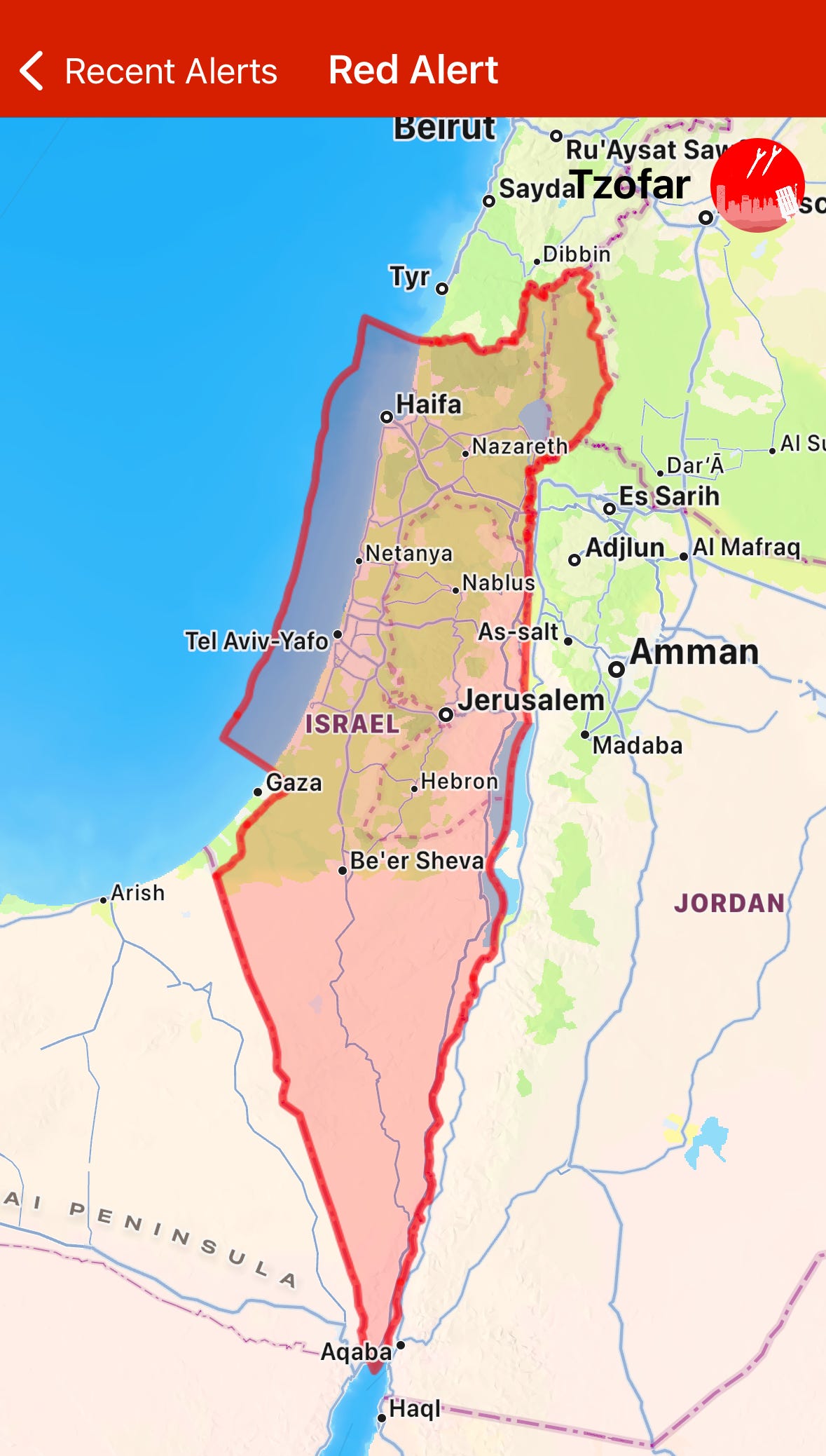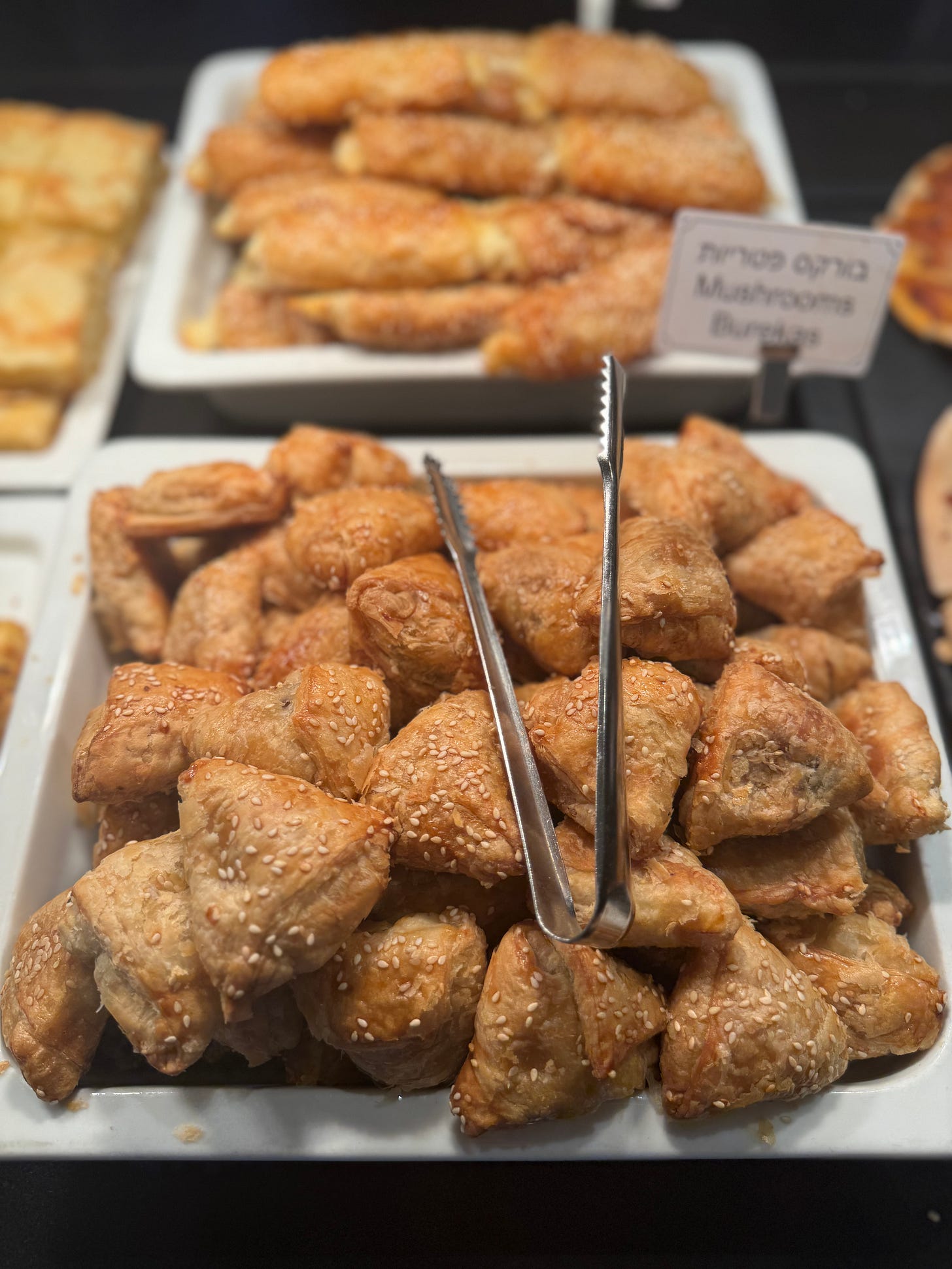I hold out for breakfast. A different breakfast. I’m back in Japan, and my stomach knows I should have eaten a plateful of cheese with salads. Not just coffee. It wants what became familiar.
From June 13-24th, we stayed in one hotel: Herod’s in Herzliya.
Yes, the only knafe I ever tried was at that hotel, and it was cold; the cheese was congealed, and the top was no longer crispy. The jachnun I ate in Israel? Only ever at this hotel, too, many mornings with slow-roasted egg and an okay-srhug.
The point is not the food, though the hotel cooks may disagree.
They were probably overworked and hella-fatigued. All of us, management, servers, bakers, dogs, grandmas, groggy families with babies, all of us, went downstairs at all hours to the parking garage (choose P1 or deeper at P2) and to other designated mamad (shelters) on each floor of the hotel. (Miklat and mamad are not new words for me since I’ve listened to so many Israeli friends talk about life in Israel on, before, and after October 7th, but it was my first time (and 800th time) going to a mamad/miklat myself).
We needed these safe places for each of the said 500 ballistic missiles and 1,000 drones shot over by the Islamic Republic of Iran during those twelve (more like thirteen) days.
Our hotel became a refuge for 250 + people, who, in a moment, completely lost their homes from one of these ballistic missiles when it struck their apartment building and surrounding homes in Petah Tikvah. They also lost a Holocaust survivor and three other incredible, can-not-get-back people, Ivette Shmilovitz, 95, Daisy Yitzhaki, 85, and Yaakov and Hadassah Belo, both 77.
And during those days, that hotel dining room became the closest I know of a kibbutz. I felt like an honorary member as these new friends of mine had been living in their same Petah Tikvah building for thirty years. Some, maybe longer.
And while I sauntered around the dining room with my white plate to fill up, I also took in the guests. First, I observed them: mothers occasionally screaming “DAI” at the kids (“stop” in Hebrew, not at all telling them to “die”). I noticed their luggage, their dogs, their spirit, and their weariness. And then I started speaking with them. I hung out in the room where my friend gave art classes with these gorgeous children. I stayed around for one afternoon while another friend helped set up and distribute deodorant, shampoo, conditioner, soap, kids’ toothpaste, diapers, wipes, and clothes. I got hugged. I dared to even dab a woman’s tear as we held hands. They lost everything beyond one small suitcase they packed, and yet—the sweetness. The patience. The love.
In that dining room, and around the hotel, whether in the shelter with staff and pajamaed families, I felt us becoming a family with them. In and out of meals and stairways with adrenaline.
Barefoot kids at times grabbing schnitzel with tongs. Same three tasty burekas at nearly every meal. Same white sauce ravioli at breakfast.
Chocolate rugelach and two kinds of halvah.
Nine kinds of cheese, all the bread, and a crazy lasagna that called to me from the buffet even at 8 am.
Our flight with El Al is cancelled. We discuss options. In the end, going by land to Jordan wins.
On the morning we are to leave: Three trips to the shelter within an hour and a half, huge booms, and somehow we are supposed to leave on a bus. This is the morning of the supposed ceasefire. But still, sirens. Still, a hit and death.
“All this”, my friend posts, “is before coffee”.
It seems unlikely and also scary that we could leave. I want my kids who are not in Israel. It is also hard to say goodbye. I eat some of the cheese and packed sesame sticks, which had become too warm as we waited for visas on a broken bench just after the border in Jordan.
My friend, Elli, on his gorgeous substack, Beyond Babylon, writes this:
“I don’t know if I’ll get out of Israel today.
But I know this:
The food we carry is the story we survive.
And Jewish food—layered, adapted, imperfect—is still cooking.
We returned last night.
I have not yet let myself eat something here for breakfast now that I'm back in Japan in my own kitchen. I am missing the coffee maker, salty cheese, and seeing my favorite people at their seats with blintzes, Kariot cereal, each sweet kid with chocolate milk, the buzz of hungry people delayed from eating another meal from yet another missile attack. Everyone’s phones blowing up with warnings and missile attacks.
And my friend, Ruth with her husband and grandkids, who doesn't stop calling me “motek” and the word she kept repeating that I now forget. She is even texting me now because of course, we write each other on Whatsapp— Iris, too.
We have invitations to return and eat with them in their homes (once they are rebuilt). I don’t know what it will be, but again, it matters and it doesn’t. It is about togetherness and knowing each other’s hearts.
But when I do take a bite at their home and feel the tablecloth, grip their glass, and taste the sambusak or the cardamom cookie, or the p’titim, babka, plain almonds, or whatever the taste, it is already going to be an incredible, lasting testament to living through terror and still rising. It will be the mightiest dish that I will savor and want to study with a magnifying glass.
Jewish Food is surely the story and the dishes of survival, and also the stories concerned with the soul, the nourishing of a people with layers of trauma, of sirens, and laughter that shoots out like steam. The more I am with our people, the more I love. The more I am in love.
And food sure is a special hook. It is the setting, the adapting of ingredients, and the tender ability to nourish what is deepest in the memory and heart.







